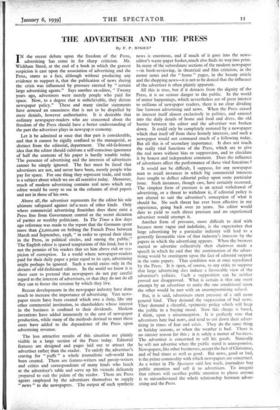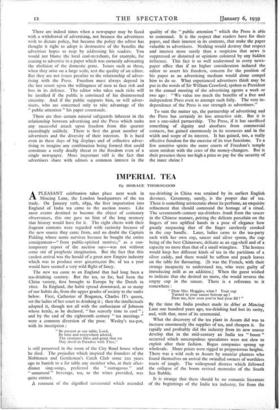THE ADVERTISER AND THE PRESS
By F. P. BISHOP
IN the recent debate upon the freedom of the Press, .I. advertising has come in for sharp criticism. Mr. Wickham Steed, at the end of a book in which the gravest suspicion is cast upon the association of advertising and the Press, states as a fact, although without producing any evidence to support it, that the publication of news during the crisis was influenced by pressure exerted by " certain large advertising agents." Says another ex-editor, " Twenty years ago, advertisers were merely people who paid for space. Now, to a degree that is unbelievable, they dictate newspaper policy." These and many similar statements have aroused an uneasiness that is not to be dispelled by mere denials, however authoritative. It is desirable that ordinary newspaper-readers who are concerned about the freedom of the Press should have a better understanding of the part the advertiser plays in newspaper economy.
Let it be admitted at once that that part is considerable, and that it cannot be rigidly confined to the managerial, as distinct from the editorial, department. The old-fashioned idea that the editor should cultivate a self-conscious ignorance of half the contents of his paper is hardly tenable today. The presence of advertising and the interests of advertisers cannot be simply ignored. The fact must be faced that advertisers are not, and never have been, merely people who pay for space. For one thing they represent trade, and trade is a subject about which we are all sensitive today. Moreover, much of modern advertising contains real news which any editor would be sorry to see in the columns of rival papers and not in those of his own.
Above all, the advertiser represents for the editor his sole ultimate safeguard against infuences of other kinds. Only where commercial advertising flourishes does there exist a Press free from Government control or the secret dictation of parties or wealthy politicians. In The Times a few days ago reference was made to the report that the Germans spent more than £2,000,000 on bribing the French Press between March and September, 1938, " in order to spread their ideas in the Press, in political circles, and among the public." The English editor is spared temptations of this kind, but it is not the pennies of his readers that set him above risk or sus- picion of corruption. In a world where newspaper-readers paid for their daily paper a price equal to its cast, advertising might perhaps be ignored. Such a world exists only in the dreams of old-fashioned editors. In the world we know it is sheer cant to pretend that newspapers do not pay careful regard to the interests of advertisers, or that they do not do all they can to foster the revenue by which they live.
Recent developments in the newspaper industry have done much to increase the importance of advertising. Vast news- paper trusts have been created which owe a duty, like any other commercial institution, to, shareholders whose interest in the business is confined to their dividends. Modern inventions have added immensely to the cost of newspaper production, while many of the methods devised to meet these costs have added to the dependence of the Press upon advertising revenue.
The less attractive results of this situation are plainly visible in a large section' of the Press today. Editorial features are designed and pages laid out to attract the advertiser rather than the reader. To satisfy the, advertiser's craving for " puffs " a whole journalistic sub-world has been created. There are feature-writers and gossip-writers and critics and correspondents of many kinds who lunch at the advertiser's table and serve up his victuals delicately prepared to suit the palate of the reader. There are Press agents employed by the advertisers themselves to supply " news " to the newspapers. The output of such synthetic news is enormous, and if much of it goes into the news- editor's waste-paper basket, much also finds its way into print. In many of the subordinate sections of the modern newspaper —in book-reviewing, in theatrical and film criticism, in the motor notes and the " home " pages, in the beauty article and the shopping news—it is not to be denied that the influence of the advertiser is often plainly apparent.
All this is true, but if it detracts from the dignity of the Press, it is no serious danger to the public. In the world of minor happenings, which nevertheless are of great interest to millions of newspaper readers, there is no clear dividing line between advertising and news. When the Press ceased to interest itself almost exclusively in politics, and entered into the daily details of home and food and dress, the old barrier between the editor and the advertiser was broken down. It could only be completely restored by a newspaper which shut itself off from these homely interests, and such a newspaper would not command much of a following today. But all this is of secondary importance. It does not touch the really vital functions of the Press, which are to give the real news without bias or suppression, and to elucidate it by honest and independent comment. Does the influence of advertisers affect the performance of these vital functions ?
It would not be difficult, I suppose, for any newspaper man to recall instances in which big commercial interests have sought to deflect editorial policy upon some particular issue. Such instances, though rare, have certainly occurred. The simplest form of pressure is an actual withdrawal of advertising, or a threat to withdraw it, if editorial policy is not altered to suit the advertiser's conception of what it should be. No such threat has ever been effective in my experience, going back over 20 years. No editor would dare to yield to such direct pressure and no experienced advertiser would attempt it.
Another form of pressure, more difficult to deal with because more vague and indefinite, is the expectation that large advertising by a particular industry will lead to a generally favourable view of that industry's interests by the papers in which the advertising appears. When the brewers started to advertise collectively their chairman made a speech in which he said that the continuation of the adver- tising would be contingent upon the fact of editorial support in the same papers. That condition was at once repudiated by the Press. It is open, of course, to any critic to suppose that large advertising does induce a favourable view of the advertiser's policies. Such a supposition can be neither proved nor disapproved. What is certain is that any overt attempt by an advertiser to make the one conditional upon the other would be met with an uncompromising refusal.
But, it is said, advertisers exert pressure of a still more general kind. They demand the suppression of had news. They demand a cheerful, optimistic policy which will keep the public in a buying mood. Now this charge is based, I think, upon a misconception. It is perfectly true that advertisers hate bad news, and tend to cut down their adver- tising in times of fear and crisis. They do the same thing at holiday seasons, or when the weather is bad. There is no sinister reason for this ; it is solely a matter of business. The advertiser is concerned to sell his goods. Naturally he will not advertise when the public mind is unresponsive. Newspapers, like other businesses, accept the fact of Christmas, and of bad times as well as good. But news, good or bad, is the prime commodity with which newspapers are concerned. As a writer in The Spectator said last week, journalists buy public attention and sell it to advertisers. To imagine that editors will sacrifice public attention to please anyone is to misunderstand the whole relationship between adver- tising and the Press. There are indeed times when a newspaper may be faced with a withdrawal of advertising, not because the advertisers wish to dictate policy, but because the policy the editor has thought it right to adopt is destructive of the benefits the advertiser hopes to reap by addressing his readers. You would not blame the local coal-merchant, for example, for ceasing to advertise in a paper which was earnestly advocating the abolition of the domestic grate. Issues such as these, when they arise on a large scale, test the quality of an editor. But they are not issues peculiar to the relationship of adver- tising with the Press. Freedom must always depend in the last resort upon the willingness of men to face risk and loss in its defence. The editor who takes such risks will be justified if the public is convinced of his disinterested sincerity. And if the public supports him, so will adver- tisers, who are concerned only to take advantage of the " public attention " his paper commands.
There are thus certain natural safeguards inherent in the relationship between advertising and the Press which make any successful attack upon freedom from this quarter exceedingly unlikely. There is first the great number of advertisers and the diversity of their interests. It is hard even in these days of big displays and of collective adver- tising to imagine any combination being formed that could constitute a really deadly threat to the freedom even of a single newspaper. More important still is the fact that advertisers share with editors a common interest in the quality of the " public attention " which the Press is able to command. It is the respect that readers have for their paper, and their interest in its contents, that make the paper valuable to advertisers. Nothing would destroy that respect and interest more surely than a suspicion that news is suppressed or distorted or opinions coloured by any hidden influence. This fact is so well understood in every news- paper office that if no higher consideration induced the editor to assert his freedom, concern for the position of his paper as an advertising medium would alone compel him to do so. What experienced advertisers think may be put in the words of Sir William Crawford, spoken as President to the annual meeting of the advertising agents a week or two ago : " We value too much the benefits of a free and independent Press even to attempt such folly. The very in- dependence of the Press is our strength as advertisers."
To sum the matter up, the partnership of advertising and the Press has certainly its less attractive side. But it is not a one-sided partnership. The Press, if it has sacrificed something of dignity and aloofness from commercial contacts, has gained enormously in its resources and in the width and scope of its interest. It has gained, too, a really effective freedom for the exercise of its true functions. To a few sensitive spirits the outer courts of Freedom's temple seem strident with the cries of the money-changers. But is their presence there too high a price to pay for the security of the inner shrine ?











































 Previous page
Previous page